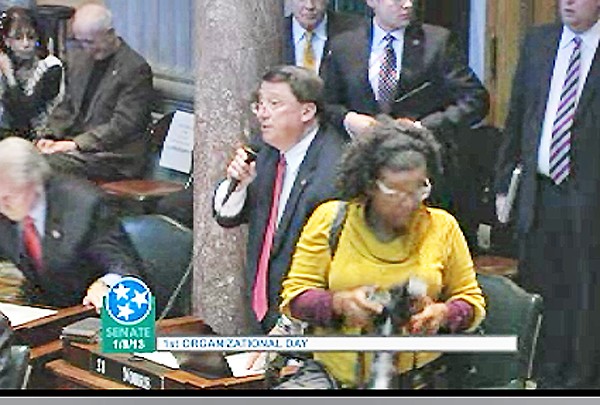
Except for conversations about a woman’s right to control her physical destiny, “choice” is a popular word among Conservative politicians and policy makers. For the businessman, it’s a near synonym for freedom, and something Rhetoric professors might call a “god word,” with high propagandistic value. “Choice,” is the banner word on The Beacon Center of Tennessee‘s page advocating for Educational Savings Accounts, like Governor Bill Lee’s re-branded and Tennessee House of Representatives-approved school voucher program. In a similar vein, fear of losing the ability to “choose healthcare providers” is key to most narratives opposing anything approaching universal healthcare coverage, just as it was when the same Beacon Center took credit for defeating medicaid expansion in Tennessee.

“While stopping the expansion of Medicaid under Obamacare was a necessary first step, it is still our responsibility as Tennesseans to find affordable healthcare solutions for our most vulnerable neighbors,” Beacon CEO Justin Owen told media. Instead of Medicaid access, Beacon supported “right-to-try” legislation, allowing terminally ill patients access to choose certain unapproved FDA treatments. A Trump-backed Federal “right to try” bill was signed into law in 2018. As noted in The Atlantic, the catchy name and promise of personal autonomy disguised a decreased ability for people who aren’t medical experts to determine if treatments were effective or safe.
If you don’t know The Beacon Center of Tennessee, previously called The Tennessee Center for Policy Research, they self-describe as “an independent, nonprofit and nonpartisan research and educational institute.” They’re the group that “exposed” former Vice President Al Gore’s energy use as part of an effort to counter “climate change alarmism.” They’re also affiliated with a right-wing cut-and-paste legislation web called the State Policy Network. It’s one of those places where movements to preserve and expand “choice” by way of free market insurance and publicly subsidized private schools are born. Tennessee’s decision not to expand medicaid didn’t make anybody more free, it put families at risk. Around 71,000 children were left without coverage. Now that Tennessee has moved a step closer toward embracing Education Savings Accounts (aka vouchers), another “choice”-forward initiative from the sewer of America’s policy factories, it’s important to understand how the word is paradoxical and may not always mean what it seems to mean.
Fred Hirsch, a former professor of International Studies at the University of Warwick, wrote about the limits of choice. In his book The Social Limits of Growth, he showed how choice can’t be made available to everyone, no matter how clever we get with technology. This is particularly true in regard to superlatives; the best doctor, for example, or the best teachers. This sounds elitist at first, but means and privilege only mitigate the effects of scarcity, they can’t erase the fact of it. Hirsch calls these troublesome things “positional goods,” and Barry Schwartz, the Dorwin Cartwright Professor of Social Theory and Social Action at Swarthmore College, expanded on the concept in The Paradox of Choice: How the Culture of Abundance Robs us of Satisfaction.
“We might all agree that everyone would be better off if there were less positional competition,” Hirsch wrote, swimming against conventional wisdom that competition is good in every case. “It’s stressful, it’s wasteful, and it distorts people’s lives.”
“Parents wanting only the best for their child encourage her to study hard so she can get into a good college. But everyone is doing that. So the parents push harder. But so does everybody else. So they send their child to after-school enrichment programs and educational summer camps. And so does everyone else. So now they borrow money to switch to private school. Again others follow.”
Sometimes the supply of positional goods just runs out — There are only so many spots in the best teacher’s classroom. Value also decreases as the result of overcrowding. Schwartz illustrates his point with a metaphor made for sports fans:
“It’s like being in a crowded football stadium, watching the crucial play. A spectator several rows in front stands up to get a better view and a chain reaction follows. Soon everyone is standing just to be able to see as well as before. Everyone is on their feet rather than sitting, but no one’s position has improved.”
Those not standing, by reason of choice or inability, might as well be somewhere else, Schwartz concludes. They aren’t in the game.
Whatever you choose to call them, voucher systems aren’t a new idea. The University of Chicago’s Nobel Prize-winning economist Milton Friedman wrote about the role of government in education in 1955, and choice advocates have been inspired by his arguments ever since. He determined that government should fund schooling. It should not run schools. Friedman advocated vouchers as a means of increasing freedom through choice in the marketplace.
Educational policy analyst Diane Ravitch related this history in her data-laden 2010 mea culpa, The Death and Life of the Great American School System. While working on national education policy for President George H. W. Bush, Ravitch had gotten caught up in choice mania, but came to regret it. Advocates of voucher systems and charter schools, “were certain choice would produce higher achievement,” and “reduce the rising tide of mediocrity,” she wrote. The collected data told a conflicting story. After reviewing the 20-year history of a voucher program in Milwaukee, Ravitch determined “there was no evidence of dramatic improvement for the neediest students or the public schools they left behind.” As with the football stadium metaphor, everybody moved, but nobody’s position really improved.
“Business leaders like the idea of turning the schools into a marketplace where the consumer is king,” Ravitch wrote, taking on presumptions that choice and competition are necessarily a public good. “But the problem with the marketplace is that it dissolves communities and replaces them with consumers. Going to school is not the same as going shopping. Parents should not be burdened with locating a suitable school for their child. They should be able to take their child to the neighborhood public school as a matter of course and expect that it has well-educated teachers and a sound educational program.”
Schwartz concludes that the scramble for positional goods creates what’s commonly called “the rat race.” That’s expressed here as “the burden of locating suitable schools” in a sea of “buyer beware.” That parents cannot “take their child to the neighborhood public school as a matter of course and expect that it has well-educated teachers and a sound educational program” isn’t a failure of teachers or public school systems or the communities where public schools are located. It’s an enduring expression of political and economic will backed by an unwarranted faith in market-based solutions.
“When people have no choice, life is almost unbearable,” Schwartz wrote in The Paradox of Choice.
“As the number of available choices increases, as it has in our consumer culture, the autonomy, control and liberation this variety brings are powerful and positive. But as the number grows further, the negatives escalate until we become overloaded. At this point choice no longer liberates, but debilitates.”
That’s the problem with punishing and stigmatizing needy schools and pumping public education money into private markets. Or, as Ravitch put it, “With so much money aligned against the neighborhood public school and against education as a profession, public education itself is placed at risk.”
That absolutely seems to be the goal.

 Justin Fox Burks
Justin Fox Burks  Justin Fox Burks
Justin Fox Burks  Justin Fox Burks
Justin Fox Burks 
